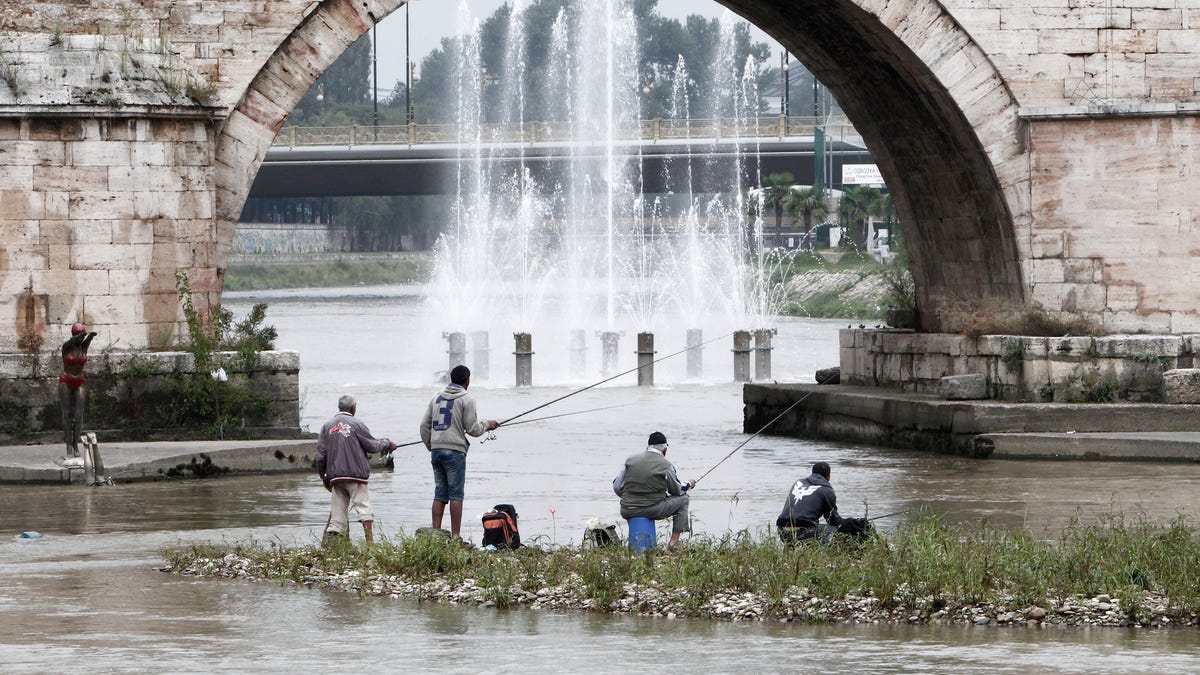
FILE -- Anglers fish near a fountain in the Vardar River, in downtown Skopje, Macedonia. (AP Photo/Boris Grdanoski)
Hate runs deep in the Balkans, and latest news from Macedonia offers even more ominous proof.
This time around, the country is on the verge of being destabilized over the legitimacy of Albanian ethnic minorities and whether or not they should be able to have their language recognized as second official language in their country in which they represent more than 25 percent of population.
These demands have been deemed “unacceptable” to the current president Gjorge Ivanov, who, in an unconstitutional move, is not allowing a coalition between Macedonia’s Social Democrats and Albanian parties to form a government.
President Ivanov has called the recent demands for more recognition to Albanian language as a “threat to Macedonia’s sovereignty.”
Is this really about a minority language or is President Ivanov trying to hide something else?
This story really began last December, when the Macedonian nationalist party VMRO, narrowly won the political election.
Nikola Gruevski, the former prime mister and leader of VMRO, was unable to convince Albanians to join him to form a government. Instead the Social Democrats (Macedonia’s second leading party), were able to sign an agreement with Albanian minorities and managed to put together the 67 minimum required seats to form a government.
But President Ivanov, and former prime minister Gruevski, are worried that if Zoran Zaev, the leader of Social Democrats who is behind the coalition, uses his powers to re-open the investigations into illicit wire-tapping and corruption scandals that have embroiled Gruevski’s government since early 2015.
This could spell the political end of Gruevski who could end up in jail over his past deeds.
To avoid jailtime for his friends, President Ivanov is instead inciting ethnic clashes over a non-issue such as the ‘use of Albanian language in public institutions.’
In fact, the use of Albanian language was part of the Ohrid agreement in 2001, when the Macedonian majority agreed to provide more rights for the ethnic Albanian minority, which makes up 25 percent of the population.
One of those rights was the integration of Albanian language as secondary official language in government and public institutions.
For those who don’t know, Macedonia was of one of those made-up republics that resulted from the disintegration of Yugoslavia.
For the western coalition, including E.U. and United States, Macedonia was (and still is) an experiment where they are trying to force a cohabitation between two ethnic groups: the majority of Macedonians and the Albanian minority. They also thought that by allowing Macedonia to join E.U. and NATO, they would discourage the country to follow its old ties with Russia and therefore stop Russian expansion in the region. That hasn’t happened yet.
“Macedonia is not a country” Rep. Dana Rohrabacher, the Chair of Subcommittee on Europe, Eurasia and Emerging Threats in US Congress said recently.
He went further to suggest that: “There is such a division in their country they will never be able to live together in the future. For this reason, Kosovars and Albanians from Macedonia should be part of Kosovo and the rest of Macedonia should be part of Bulgaria or any other country to which they believe they are related.”
Adding to the same chorus was Albanian Prime Minister Edi Rama, who responded to President Ivanov by telling him: “Mr. Ivanov, Albanian is not the language of the enemy but of a state forming population in Macedonia. Without Albanians, there is no Macedonia dear President!”
If President Ivanov refuses to compromise, and to grant ethnic Albanians the rights due to them, it is hard to see how this controversy will not hurl Macedonia, and possibly the entire Balkan region, into chaos and possibly even war.
It is vital that global powers, including the E.U. and the U.S. intervene to make sure more blood is not spilled on Balkan soil.








































